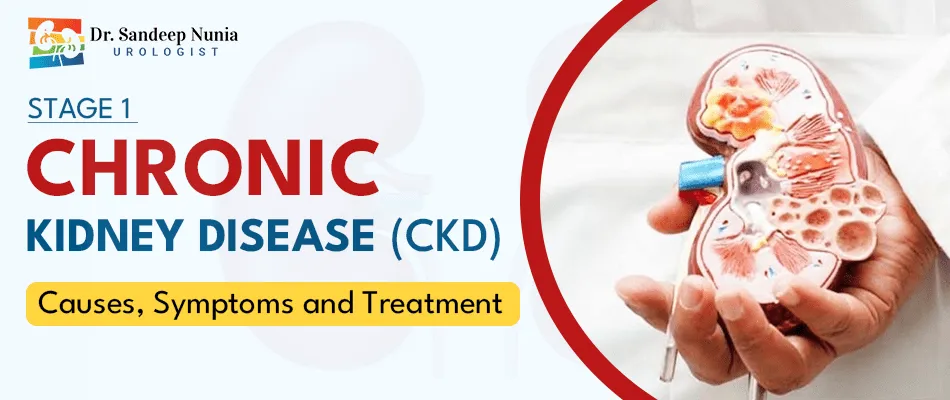
Stage 1 of chronic kidney disease CKD: Causes, symptoms and treatment
Revealing the primary phase of Chronic Kidney Disease (CKD): an investigation into its origins, signs, and therapeutic approaches. Grasping this fundamental phase proves essential in detecting and addressing the condition promptly, leading to enhanced results and a better lifestyle for CKD patients.
What is Stage 1 CKD?
Chronic Kidney Disease (CKD) 1st stage symptoms signifies the initial phase of kidney dysfunction, characterized by subtle impairment and a slight decline in kidney function. At this stage, the kidneys function normally but exhibit early signs hinting at potential kidney disease, emphasizing the paramount importance of timely detection for effective management.
A key indicator of kidney disease 1st stage symptoms involves evidence of kidney damage, often detected through specialized diagnostic tests like urine or blood examinations. Even though kidney function remains efficient in filtering blood, patients in this stage frequently do not manifest visible symptoms. Therefore, regular screenings are pivotal, particularly for individuals at risk due to factors such as diabetes, high blood pressure, or a family history of kidney disease.
Although Stage 1 CKD might not present immediate health concerns, early detection and proactive measures are crucial in slowing or halting the progression of kidney disease. Regular consultations with healthcare professionals for routine check-ups and consistent adherence to recommended lifestyle changes serve as pivotal components in effectively managing Stage 1 CKD, averting its progression to more severe stages.
Causes, symptoms and treatment
● What are the Causes of stage 1 CKD?
– Hypertension and elevated blood pressure levels
– Diabetes mellitus, particularly uncontrolled blood sugar levels
– Family history indicating a predisposition to kidney ailments
– Autoimmune disorders such as lupus impacting kidney health
– Glomerulonephritis, characterized by kidney filter inflammation
– Urinary tract infections (UTIs) affecting kidney function
– Kidney stones or structural irregularities affecting renal health
These factors play a role in initiating Chronic Kidney Disease (CKD) by either causing damage to the kidneys or hindering their optimal functionality.
● What are the kidney disease 1st stage symptoms?
– Usually, no overt symptoms, making it asymptomatic in its early stage
– Potential lack of visible signs despite underlying kidney damage
– Possible subtle manifestations might include:
– Minor alterations in the color or frequency of urination
– Slight increases in blood pressure levels
– Occasional feelings of fatigue or weakness
– Infrequent swelling in the extremities
– Minor fluctuations in laboratory tests, such as eGFR or albuminuria levels
– The absence of prominent symptoms underscores the necessity for regular screenings, especially for individuals at high risk due to conditions like diabetes, hypertension, or a family history of kidney disease.
● What are the treatment of stage 1 CKD?
Treatment for Stage 1 Chronic Kidney Disease (CKD) primarily concentrates on addressing root conditions, mitigating risk factors, and impeding further kidney impairment. Due to the subtle or absent symptoms in this stage, the objective is to curtail or decelerate the disease’s progression, averting its advancement to more severe phases.
- Control of Blood Pressure and Glucose Levels: Managing hypertension and regulating blood sugar, especially in diabetic individuals, is pivotal. This encompasses adhering to prescribed medications, adjusting dietary patterns, engaging in regular physical activity, and routinely monitoring blood pressure and glucose levels.
- Embrace a Healthier Lifestyle: Adopting a wholesome lifestyle is crucial in Stage 1 CKD management. This includes consuming a balanced diet with limited sodium, reducing intake of processed foods, and managing protein consumption. Guidance from a dietitian can help create a tailored kidney-friendly dietary plan.
- Smoking Cessation: Halting smoking or averting exposure to tobacco is imperative as it adversely affects kidney function and overall health.
- Regular Physical Activity: Participating in physical activities as recommended by healthcare providers is beneficial for overall health, aiding in managing blood pressure and weight, which, in turn, supports kidney health.
Adhering to these multifaceted strategies and seeking continuous support and guidance from healthcare providers are pivotal in effectively managing Stage 1 CKD, ensuring optimal kidney health, and enhancing overall quality of life.
Conclusion
Chronic Kidney Disease (CKD) 1st stage symptoms holds immense importance in initiating prompt and effective interventions. This initial phase often remains inconspicuous, underscoring the critical need for regular screenings, particularly among those with predisposing factors. Early detection allows for proactive measures, embracing lifestyle alterations and targeted therapies aimed at impeding the progression to more advanced CKD stages. Overall, a proactive stance, consistent monitoring, and adherence to recommended strategies stand as fundamental pillars in attenuating the impact of kidney disease 1st stage symptoms, fostering improved outcomes, and elevating the overall quality of life. then you should consult the Best Urologist In Jaipur. Dr Sandeep Nunia is the most reputed Urology doctor in Jaipur and has years of work experience and is the best Urologist in Jaipur for treating ailments such as Laparoscopic treatment, Female Urology, Sexology treatment, Uro Oncology, and Kidney stone treatment.